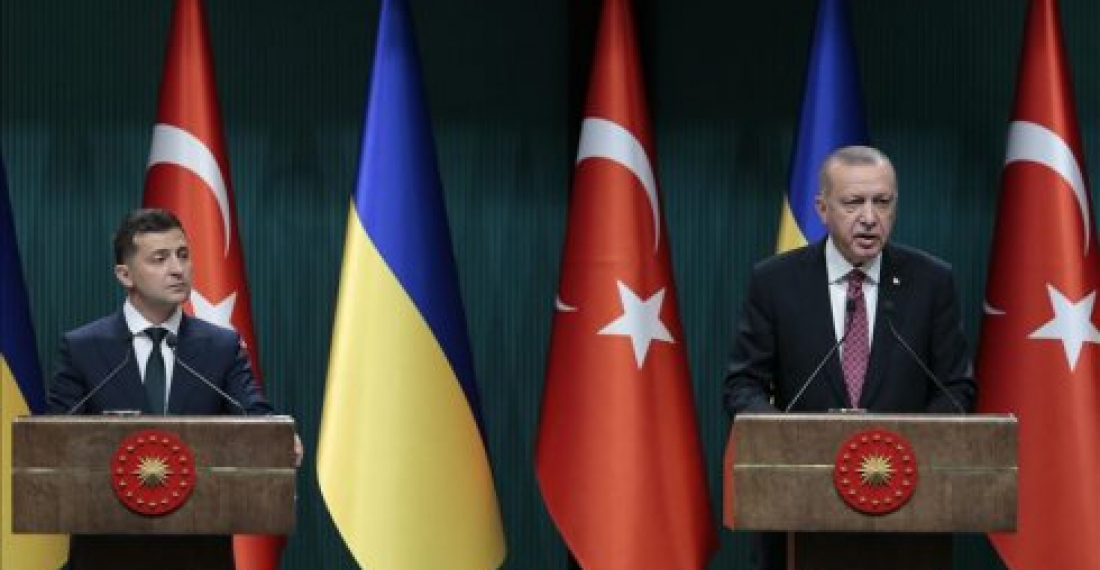Ukrainian President Volodymyr Zelensky paid a visit to Ankara on Wednesday, holding talks with his Turkish counterpart Recep Tayyip Erdogan. Over the past several years, relations between the two countries have reached a new level of strategic partnership, focusing on building up defense cooperation and economic ties. The rapprochement between Kiev and Ankara started growing amid a sudden rift with Moscow after Turkey's Air Force shot down a Russian Su-24 bomber and rocky relations with the European Union, which forced both countries to seek each other's support, Izvestia writes.
Turkey is teetering between Russia and Ukraine: while not supporting Crimea's reunification with Russia, Ankara opposes Western sanctions against Moscow, saying that the restrictions have dealt a serious blow to the Turkish economy as well. Meanwhile, Kiev is not glad about Ankara's position and is also concerned over the construction of the TurkStream pipeline that will bring Russian gas to the EU bypassing Ukraine. the newspaper wrote.
During his talks with Erdogan, Zelensky apparently tried to achieve some concessions from Turkey, a leading research fellow at the Institute of World Economy and International Relations of the Russian Academy of Sciences Viktor Nadein-Rayevsky told Izvestia. "Friendship against Russia is what unites Ukraine and Turkey," he said. Touching on TurkStream, the expert said that Turkey had a real chance now to become an important hub for supplying Europe with gas, and Ankara would not lose its advantages.
Turkish political scientist Serkan Demitras is sure that TurkStream's construction won't mar cooperation between Ankara and Kiev. "The two states, which have access to the Black Sea, started fostering ties shortly after the Soviet Union's collapse," the expert said. "Ukraine seeks integration into various Western bodies - NATO and the EU, viewing Turkey as a good ally for help on these issues. Turkey sees Ukraine as an important force in the region and a good economic partner. While observing what close ties Russia and Turkey have now, Kiev wants to use Ankara as a mediator at its talks with Moscow", Izvestya quoted the Turkish expert as saying.
President Recep Tayyip Erdogan said Wednesday that Turkey will not accept the illegal annexation of Crimea. He was speaking in Ankara after meeting his Ukrainian counterpart in Ankara. Speaking at a joint press conference Erdogan said: "Continuation of our kinsmen's existence in their historical motherland Crimea, protection of their identity and culture, preservation of their basic rights and freedoms are Turkey's priorities."
During the press conference the Ukrainian President Volodymyr Zelensky called on Russia to act within international laws.
He stressed that Crimea belonged to Ukraine and said his country and Russia would find a common path to re-establish peace and stability in the region. He described Turkey as a "good neighbor, sincere friend and important strategic partner," in highlighting Turkey's importance to relations with Ukraine. "I would like to thank you for your steady support for the sovereignty and territorial integrity of Ukraine," Zelensky said.
Zelensky said he wanted to make his country a "center of attraction" for foreign investors through economic and trade reforms. Trade reached $4 billion in 2018 between Turkey and Ukraine, said Zelensky and the figure does not reflect the potential of the two countries. The target trade volume between the two nations is $ 10 billion and a free trade agreement will also pave the for reaching this goal, he said. "I would like to invite the Turkish business world to Ukraine," said Zelensky and he guaranteed a comfortable work environment.
Erdogan said he hoped that the conflict in the eastern Donbass region of Ukraine will end as soon as possible.
"We believe that the problem could be resolved peacefully in line with international law and the Ukraine's territorial integrity," he added.
source: commonspace.eu with TASS news agency and Izvestya (Moscow) and Anadolu News Agency (Ankara)
photo: President Zelenskiy of Ukraine and president Erdogan of Turkey at their joint press conference in Ankara on Wednesday 7 August 2019 (picture courtesy of Anadolu News Agency (Ankara)






